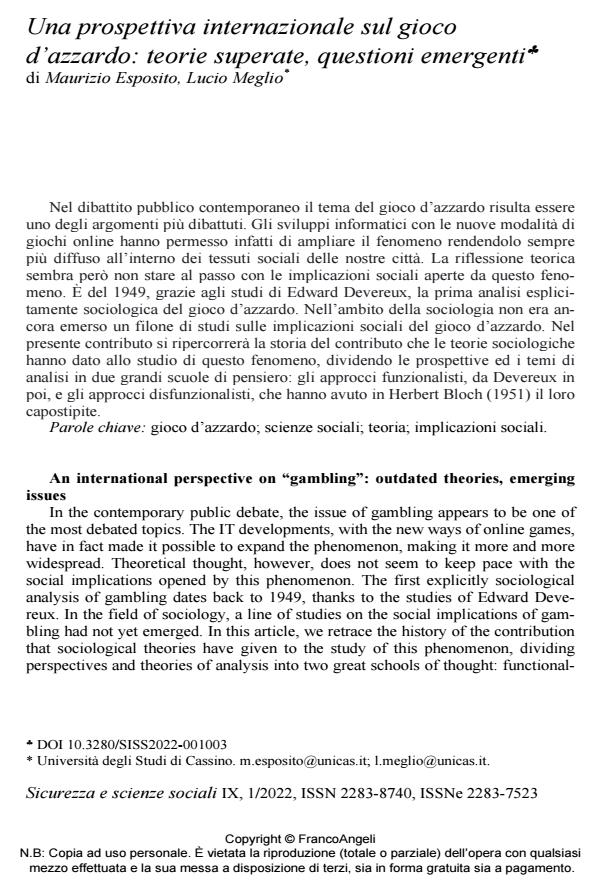Una prospettiva internazionale sul gioco d’azzardo: teorie superate, questioni emergenti
Titolo Rivista SICUREZZA E SCIENZE SOCIALI
Autori/Curatori Maurizio Esposito, Lucio Meglio
Anno di pubblicazione 2022 Fascicolo 2022/1
Lingua Italiano Numero pagine 15 P. 15-29 Dimensione file 249 KB
DOI 10.3280/SISS2022-001003
Il DOI è il codice a barre della proprietà intellettuale: per saperne di più
clicca qui
Qui sotto puoi vedere in anteprima la prima pagina di questo articolo.
Se questo articolo ti interessa, lo puoi acquistare (e scaricare in formato pdf) seguendo le facili indicazioni per acquistare il download credit. Acquista Download Credits per scaricare questo Articolo in formato PDF

FrancoAngeli è membro della Publishers International Linking Association, Inc (PILA)associazione indipendente e non profit per facilitare (attraverso i servizi tecnologici implementati da CrossRef.org) l’accesso degli studiosi ai contenuti digitali nelle pubblicazioni professionali e scientifiche
Nel dibattito pubblico contemporaneo il tema del gioco d’azzardo risulta essere uno degli argomenti più dibattuti. Gli sviluppi informatici con le nuove modalità di giochi online hanno permesso infatti di ampliare il fenomeno rendendolo sempre più diffuso all’interno dei tessuti sociali delle nostre città. La riflessione teorica sembra però non stare al passo con le implicazioni sociali aperte da questo fenomeno. È del 1949, grazie agli studi di Edward Devereux, la prima analisi esplicitamente sociologica del gioco d’azzardo. Nell’ambito della sociologia non era ancora emerso un filone di studi sulle implicazioni sociali del gioco d’azzardo. Nel presente contributo si ripercorrerà la storia del contributo che le teorie sociologiche hanno dato allo studio di questo fenomeno, dividendo le prospettive ed i temi di analisi in due grandi scuole di pensiero: gli approcci funzionalisti, da Devereux in poi, e gli approcci disfunzionalisti, che hanno avuto in Herbert Bloch (1951) il loro capostipite.
Parole chiave:gioco d’azzardo; scienze sociali; teoria; implicazioni sociali.
Maurizio Esposito, Lucio Meglio, Una prospettiva internazionale sul gioco d’azzardo: teorie superate, questioni emergenti in "SICUREZZA E SCIENZE SOCIALI" 1/2022, pp 15-29, DOI: 10.3280/SISS2022-001003